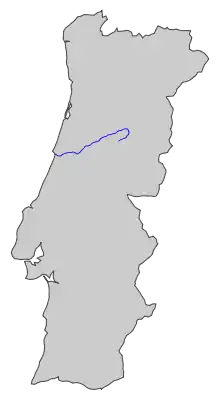
The Rio Mondego (Portuguese pronunciation: [ˈʁi.u mõˈdeɣu]) or Mondego River is the longest river entirely within Portuguese territory.[1] It has its source in Serra da Estrela, the highest mountain range in mainland Portugal (i.e. excluding the Portuguese islands). It runs 234 kilometres (145 mi) from the Gouveia municipality, at 1,425 metres (4,675 ft) above sea level in Serra da Estrela, to its mouth in the Atlantic Ocean next to the city of Figueira da Foz.
Etymology
The river's name is believed to be derived from the pre-Roman, Hispano-Celtic word Munda or Monda — by which names it had been referred to in the classical antiquity by Pliny and Ptolemy —, later latinised into Mondæcus until evolving into the present name.[2][3]
Geography
It flows through the districts of Guarda, Viseu and Coimbra, all in Central Portugal. It flows near the towns of Celorico da Beira, Fornos de Algodres, Nelas, Tábua, Carregal do Sal and Mortágua and the cities of Seia, Gouveia, Guarda, Oliveira do Hospital, Mangualde and Santa Comba Dão, before crossing the town of Penacova. The river widens by the city of Coimbra (a historical city, the largest of the region, with a university as a World Heritage Site), and the Montemor-o-Velho municipality (known for its castle and rice fields), before reaching the Atlantic Ocean at the city of Figueira da Foz.[4]
There are two main dams along the Mondego, the Aguieira Dam and the Raiva Dam, as well as a smaller one at Coimbra's main bridge.[5]
Tributaries
One of its tributaries is the Rio Dão, which gives its name to the Dão wine region. Another is the Alva River, which enters the Mondego just before Penacova. The Ceira River enters the Mondego just south of Coimbra along National Road 17.[6]
Gallery
 Coimbra and the Mondego
Coimbra and the Mondego Mondego bank in Coimbra
Mondego bank in Coimbra Rainha Santa Isabel Bridge over the Mondego
Rainha Santa Isabel Bridge over the Mondego Mondego in Coimbra by night
Mondego in Coimbra by night Mondego as it passes Caldas de Felgueira, Nelas, Portugal
Mondego as it passes Caldas de Felgueira, Nelas, Portugal
See also
References
- ↑ "Mondego" by Manuel Pinheiro, Final Project of a masters's degree in Wildlife Documentary Production from the University of Salford. Film marked with a distinction. Filmed in Portugal during May/June 2011. A voyage by the Mondego river's wildlife from the mountains to the sea.
- ↑ "Mondego | Definição ou significado de Mondego no Dicionário Infopédia de Toponímia". Infopedia.pt.
- ↑ Chao, Eduardo (1849). Cuadros de la geografia historica de Espana desde los primeros tiempos historicos hasta el dia (Etc.). p. 188.
- ↑ "River Mondego". Mapmywalk.com. Retrieved 7 June 2022.
- ↑ Dams in Central Portugal. Retrieved 7 November 2022.
- ↑ "40°11'02.0"N 8°23'46.0"W". Google.com. Retrieved 7 June 2022.
40°12′47.41″N 8°20′41.25″W / 40.2131694°N 8.3447917°W